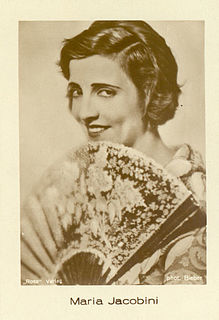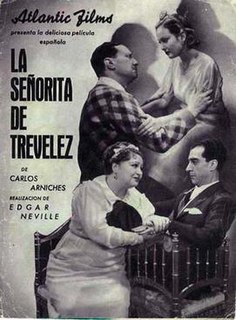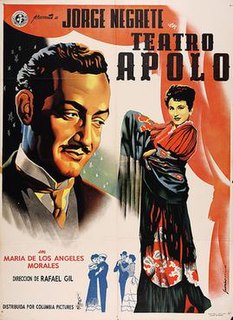Related Research Articles
La storia di un peccato is a 1918 silent Italian drama film based on the novel by Polish writer Stefan Żeromski of the same title directed by Carmine Gallone.

Maria Jacobini was an Italian film actress. She was married to the film director Gennaro Righelli and appeared in many of his silent films for the Vesuvio Film Company. She worked in the German film industry in the mid-1920s. She was the older sister of actress Diomira Jacobini.

Restless Hearts is a 1928 German-Spanish silent film directed by Benito Perojo and Gustav Ucicky and starring Betty Bird, Hanna Ralph and Livio Pavanelli.
Take Me to Hollywood is a 1931 Spanish comedy film directed by Edgar Neville, starring Perlita Greco. It was one of the earliest Spanish sound films.

The Lady from Trévelez is a 1936 Spanish drama film directed by Edgar Neville and starring Edmundo Barbero, Antoñita Colomé and Fernando Freyre de Andrade. The film is based on the play of the same name by Carlos Arniches. It was remade in 1956 as Calle Mayor.
House of Cards is a 1943 Spanish comedy film directed by Jerónimo Mihura and starring Blanca de Silos, Raúl Cancio and Manolo Morán.

Fernando Delgado (1891-1950) was a Spanish actor, screenwriter and film director. Delgado directed a mixture of documentary and feature films, including the 1936 bullfighting drama Currito of the Cross. His son Luis María Delgado was also a film director.
Currito of the Cross is a 1965 Spanish drama film directed by Rafael Gil and starring Francisco Rabal, Arturo Fernandez and El Pireo. It is an adaptation of the novel of the same title by Alejandro Pérez Lugín.
Currito of the Cross is a 1921 novel by the Spanish writer Alejandro Pérez Lugín which portrays the rise of a young bullfighter.

Alejandro Pérez Lugín (1870–1926) was a Spanish writer and film director. He attended university in Santiago de Compostela, and a number of his books have Galician themes. His 1921 novel Currito of the Cross, which uses bullfighting as its backdrop, has been adapted into film four times. Pérez Lugin himself directed successful film adaptations of two of his works during the silent era.
Currito of the Cross is a 1936 Spanish drama film directed by Fernando Delgado and starring Antonio Vico, Elisa Ruiz Romero and José Rivero. The film was adapted from Alejandro Pérez Lugín's 1921 novel of the same title, set in the bullfighting world.
Take Care of Amelia is a 1925 Italian silent comedy film directed by Telemaco Ruggeri and starring Pina Menichelli, Marcel Lévesque and Elena Lunda. It is based on the 1908 play Occupe-toi d'Amélie! by Georges Feydeau, which has been made into several films. It was the final film to star Menichelli, one of the leading divas of early Italian cinema.
Mercedes is a 1933 Spanish romantic comedy film directed by José María Castellví. It was a commercial success on its release, but is now considered a lost film.
Public Trial is a 1946 Spanish drama film directed by Florián Rey and starring Paola Barbara.
The Unloved Woman is a 1940 Spanish drama film directed by José López Rubio. It is based on the 1913 play of the same title by Jacinto Benavente.
The Last Torch Song is a 1957 Spanish musical film directed by Juan de Orduña and starring Sara Montiel, Armando Calvo and Enrique Vera.

Journey to Nowhere is a 1942 Spanish comedy film directed by Rafael Gil and starring Antonio Casal, Luchy Soto and Alberto Romea.

Apollo Theatre (Spanish: Teatro Apolo is a 1950 Spanish musical film directed by Rafael Gil and starring Jorge Negrete, María de los Ángeles Morales and Juan Espantaleón. It takes its title from the Teatro Apolo in Madrid.
Pastora Peña (1920–2003) was a Spanish film actress. Her brother was the actor Luis Peña.
Angela Dalle Vacche is a professor in the School of Literature, Media, and Communication at the Georgia Institute of Technology. Her professional area of expertise is in film studies, with a focus on world cinema. She specialises in Italian cinema, with numerous books and publicized materials on the subject. She is especially interested in exploring the role of gender in Italian cinema. Her book “Diva: Defiance and Passion in Early Italian Cinema” delves into the topic of the Italian diva and the “emancipation and self-discovery” that the role offers to its female audience.